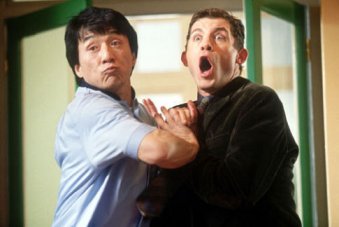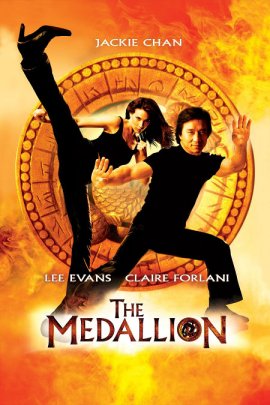|
The Medallion
The chain
that leads to The Medallion might have gone something
like this.
"It's
like Highlander. Instead of Christopher Lambert, use
Jackie Chan. Oh, and rather than that weird Kurgan guy, follow
the Hong Kong tradition of cold British villains by using
Julian Sands. See? It's totally different - it's called Highbinders.
Wait.
That still sounds too close? Okay. Throw in a love interest,
but remember that Jackie's fans really could care less about
the love stuff. We need it to have a little more international
appeal, so make her someone who has been in some American
movies, but is still British - Claire Forlani, great idea.
Her acting won't overwhelm Jackie, no how. Besides, she's
got nice …eyes.
We need
comic relief. How about Lee Evans? Americans don't quite get
him, but they thought he was funny in There's Something
About Mary. He serves a valuable purpose: keep people
from noticing that we only plotted enough to cover about a
half hour. Maybe he can bumble or something. Yeah, that's
it.
Dang.
Still too obviously close to Highlander? No, no, a
lot of that movie took place in Scotland. We're in Ireland,
totally different. What do you mean, none of the actors are
Irish? Like Sean Connery looked like a Ramirez…no one will
notice."
Clearly,
at the last minute the crew, led by co-writer and director
Donald Chan, decided someone would notice, so all actual references
to Highbinders got cut from the film. (Except in the obligatory
closing credit outtakes, in which almost every scene has a
reference to the title Highbinders.) With those cuts
also went much of the film's coherence (maybe that's optimistic),
as most of the plot now just sort of vaguely references things
of great import.
However,
The Medallion does show a little promise. It starts
out creepily enough, with Sands reciting prophecy from an
ancient text, then threatening the book dealer who found it
for him. The scene shifts to Hong Kong, where Detective Eddie
Yang (Chan) sits as part of a stake-out with Interpol, there
to track down the evil mastermind known as Snakehead.
That
nobody actually knows what Snakehead looks like is a detail
thrown in way after the fact. Had we not known, there
might have been some crude sense of suspense. Also, just what
Snakehead is supposed to have done also gets left out; his
trying to get the titular Medallion is an element completely
out of the blue as far as Interpol is concerned.
 To
be fair, there might have been an explanation, but it gets
lost in an awkward mixture of action and buffoonery between
Chan and Evans as Interpol Agent Watson. The film plays straight
until Watson goes into action, then he gets all goggle-eyed
and pathetic, pulling his gun on no fewer than three different
statues of the Buddha in a temple raid. To
be fair, there might have been an explanation, but it gets
lost in an awkward mixture of action and buffoonery between
Chan and Evans as Interpol Agent Watson. The film plays straight
until Watson goes into action, then he gets all goggle-eyed
and pathetic, pulling his gun on no fewer than three different
statues of the Buddha in a temple raid.
Yep,
when a lame gag gets repeated that many times in so short
a sequence, you know it's going to be a long night.
And so
it is. Snakehead accomplishes his goal, kidnapping a young
boy known as "The Chosen One." According to the prophecy,
by combining the chosen one's mystical energy with that of
The Medallion, immortality will be granted.
Actually,
it seems less immortality and more like super-cloning. And
there also comes a warning that the boy can bring death as
well, though that only sort of pays off.
For at
least half an hour, however, the filmmakers pad the plot with
side trips in which Yang must convince Watson to let him help
find Snakehead in Ireland. Supposedly Watson is a crack agent,
yet at no point does the movie show him behaving in any way
near competent.
Nor does
he follow orders well, because when his superior (John Rhys-Davies,
failing the wooden puppet test) tells him he has to work with
Yang, he refuses and stalks off into a filing closet.
In a
fit of Brady Bunchian logic, Agent Nicole James (Forlani)
suggests that if they get to know Watson's family, he'll have
to team with Yang. Yes, they cook, they dance, they have dinner.
And of course they bond.
 But at the earliest opportunity on the job, they ditch Watson.
Go figure.
But at the earliest opportunity on the job, they ditch Watson.
Go figure.
There's
more - obviously from the commercials, Chan gains superpowers,
and so does Snakehead, for a climactic duel. But it's all
just terribly boring. Every time somebody suggests the worst
next possible thing that could happen, it happens, without
much of a fight, a tepid struggle, or even really a reaction.
Even
the fight scenes, the real reason people love Jackie Chan,
fail to ignite any excitement. Long-time Jackie Chan cohort
Sammo Hung may have done an incredible job choreographing
it all, but the director and editor, Ki-Hop Chan, conspire
against Hung. Everything is undone by quick cuts and odd switches
in point of view, so we're never quite sure who did what to
whom and why.
The two
exceptions would be in the face-offs between Yang and Snakehead,
but only because not much actually happens. They run at high
speeds. Then they fly at each other. There's even a moment
when they go all M.C. Escher on each other, one done better
by both Labyrinth and even The Cradle of Life.
There
are a couple of legitimate laughs, too, once Yang becomes
immortal. He and Watson test the limits, and only then does
the British comedian's slapstick skill work, because for the
first time we can actually understand why he would
do what he does.
If they'd
jettisoned the first half, Evans' performance might have seemed
funnier. It's much easier to forgive him being a prat after
he's been faced with the unbelievable situation of seeing
a "friend" resurrect.
The
Medallion is ham-handed filmmaking that will still make
kids laugh. Years later they'll be embarrassed by it. Heck,
Jackie Chan should be embarrassed by it now. Something has
gone terribly wrong when a movie like this makes you long
for the wit and cleverness of the Rush Hour films.
Rating:

|

 To
be fair, there might have been an explanation, but it gets
lost in an awkward mixture of action and buffoonery between
Chan and Evans as Interpol Agent Watson. The film plays straight
until Watson goes into action, then he gets all goggle-eyed
and pathetic, pulling his gun on no fewer than three different
statues of the Buddha in a temple raid.
To
be fair, there might have been an explanation, but it gets
lost in an awkward mixture of action and buffoonery between
Chan and Evans as Interpol Agent Watson. The film plays straight
until Watson goes into action, then he gets all goggle-eyed
and pathetic, pulling his gun on no fewer than three different
statues of the Buddha in a temple raid.
 But at the earliest opportunity on the job, they ditch Watson.
Go figure.
But at the earliest opportunity on the job, they ditch Watson.
Go figure.





